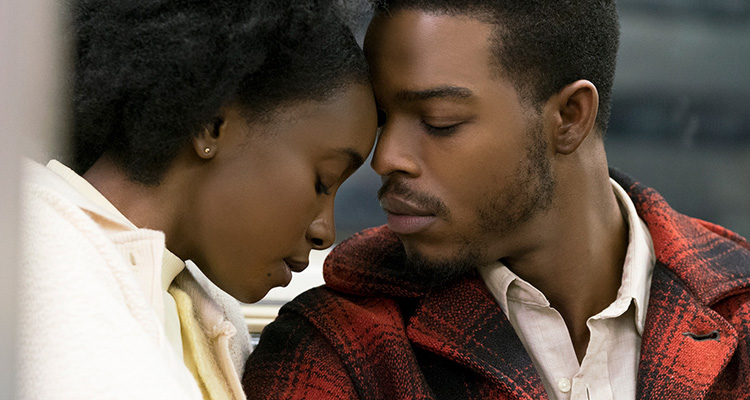If Beale Street Could Talk (USA / 15A / 119 mins)
In short: Love conquers all
Directed by Barry Jenkins. Starring KiKi Layne, Stephan James, Regina King, Colman Domingo, Pedro Pascal, Ed Skrein.
The Plot: Harlem, the early 1970s. 19-year-old Tish (KiKi Layne) has fallen hard for her childhood friend Fonny (Stephan James). It wasn’t until they were older that she felt deeper feelings for him. They take it to the next level and begin a tender and passionate romance, much to the disapproval of Fonny’s mother. While they believe truly, madly, deeply in their love, it will be tested. Fonny ends up in jail, awaiting trial for a heinous crime that he strongly denies committing. He just happened to be in the wrong place at the wrong time. An unexpected pregnancy complicates matters, but the optimistic Tish embraces her impending child and hopes that the legal system will do right by Fonny. He belongs by her side…
The Verdict: When Moonlight was (eventually!) announced as the Best Picture winner at the 2017 Oscars, all eyes were on director Barry Jenkins and his next move. He made a startling feature debut with Moonlight, so expectations are understandably high for his new film If Beale Street Could Talk. He builds on the originality of Moonlight to deliver his own spin on another love story. He picked a real cherry for his second feature. Based on James Baldwin’s novel, it begins with a quote from the author which explains the title. Beale Street is in New Orleans, but it’s also a microcosm of African-American life, culture and experiences as a whole. If this street could talk, it could tell many heartfelt stories. This film tells one such story, a tale of hopeful young love in a time of trial.
Jenkins’ greatest strength here is in distilling Baldwin’s novel down to its core: that of the central relationship between Tish and Fonny. You fully believe in this gentle romance early on, due in no small part to the delicate but well-judged performances from Layne and James. Jenkins occasionally switches perspectives and follows another character, such as Tish’s mother Sharon (Regina King) who attempts to track down Fonny’s accuser. There are many potential diversions here in the story, which Jenkins himself adapted. The threat of a courtroom drama and a battle over injustice looms large later on. That’s a calculated risk on Jenkins’ part, but he neatly packages it away into the background so that it doesn’t upset his careful equilibrium. This film is not quite what you expect it to be. It’s much more about how real love survives no matter what happens or how much time passes. Love does indeed conquer all.
It might be a cliché to say that, but If Beale Street Could Talk turns that cliché inside out and pumps up the grain of truth that so often exists inside. Jenkins does this in such a subtle way that he avoids the pitfalls of modern film romances, their sense of inevitable collapse and then reconciliation. He fully invests in his two lead characters and trusts that the audience will believe in the strength of their relationship. If Moonlight was fragmented because it looked at three key stages of a young man’s life, then If Beale Street Could Talk feels more rounded because of its singular focus on its characters. Beautifully shot by James Laxton and scored by Nicholas Britell, the film is clearly the product of much thought. It comfortably gets over that difficult second album syndrome and cements Jenkins’ reputation as a rising talent, who can command his actors to get to the truth of their characters. A touching love story told with authenticity, it may just conquer your heart.
Rating: 4 / 5
Review by Gareth O’Connor


